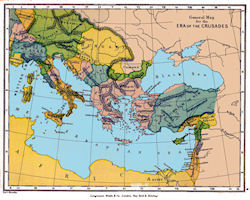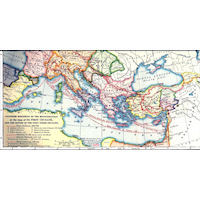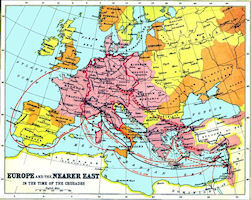1095-1274 - The Crusades
The Saracens had been content with restricting the public exercise of the rites of the Christian religion in Jerusalem ; but the Turks, who obtained possession of the city in 1076, insulted and put to death the Christian believers. " The sanctuaries of the Christians were profaned, their worship interrupted, and their patriarchs thrown into dungeons." The fleets from Italy which had been in the habit of supplying the wants of the pilgrims were driven away. Peter the Hermit, a returned pilgrim, whose anger had been aroused by the indignities heaped on Christians in Palestine, went through Europe preaching a crusade against the infidel, and Europe was quickly kindled into a flame. Pope Urban II, in the year 1095, at a great meeting held in Clermont gave his sanction and blessing. "You are," he said, " the soldiers of the cross ; bear then on your hearts and on your shoulders the blood-red sign of Him who died for the salvation of your souls."
- The leaders of the first expedition were the flower of the chivalry of the West They were Godfrey of Bouillon ; Robert, Duke of Normandy; Raymond, Count of Toulouse; Bohemond, and Tancred. Before they set out Peter the Hermit gathered two hundred thousand men, women, and children, and started for Jerusalem ; only seven thousand of them reached Constantinople, and this fragment was cut to pieces soon after crossing the Bosporus. The army under Godfrey reached Constantinople, Christmas, 1096, and crossed over to Asia, May, 1097. They marched through Asia Minor, defeated the Turks in the decisive battle of Dorylaeum, captured Antioch in 1098, and after a long delay marched down the coast to Joppa, and then turned towards Jerusalem. When they came in sight of the city they fell down on their knees and kissed the earth; they made the rest of the journey to the city walls in bare feet and pilgrim dress. After a siege of thirty days Jerusalem was taken by an assault in which the crusaders displayed a reckless bravery. The Mohammedan inhabitants were slaughtered without mercy; the streets of the city literally ran with blood; worship at the Church of the Holy Sepulchre alternated with the massacre of men, women, and children. The leaders of the Crusade remained in the East; Godfrey was made king of the Latin kingdom of Jerusalem, which lasted eighty-eight years (1099-1187).
- The second Crusade was preached by Bernard of Clairvaux, in the twelfth century ; its immediate occasion was the fall of the Latin principality of Edessa, in Asia Minor. Its leaders were Louis VII, the King of France, and Conrad, the German emperor. It was unfortunate from its beginning to its end. Shipwreck on the sea and defeat on land diminished the numbers of the armies, and an unsuccessful siege of Damascus (1148) completed its failure. Other disasters followed. For years the warfare languished. It was revived by Saladin. Saladin, the nephew of the Caliph of Aleppo, defeated the Christian army in the battle of Tiberias (1187) and immediately turned his armies against Jerusalem. After a futile resistance the city surrendered, the cross was hauled from the dome of the Mosque of Omar, and the Latin kingdom of Jerusalem was at an end. It never had any promise of stability ; for of statesmanship the crusaders had not the slightest tincture. They could fight, they could plunder, and they could be devout after their fashion; and these were about all.
- The third Crusade was more successful, though it did not recover Jerusalem. It was led by Richard of England, the Lion-hearted, Philip Augustus of France, and Frederick Barbarossa. It was organized in 1188. The German emperor was drowned in a Cilician river, and nine tenths of his army perished. The remnant encountered Saladin in the neighborhood of Acre and defeated him (1191). Saladin was compelled to surrender what was called the true cross, and to give hostages for the payment of a large tribute. The tribute was not paid, and the hostages, to the number of three thousand, were slaughtered. But for dissensions among the crusaders Jerusalem might have been taken ; the Crusade ended in a truce of three years and eight months between Richard and Saladin ; its terms opened the way for all pilgrims to Jerusalem without molestation or tax. The total result was the acquisition of a strip of land on the seacoast which included Joppa and Acre.
- The fourth Crusade was marshalled by the Knights of St. John (1193). The crusaders captured Joppa, which had been lost after Richard returned home, and also Berytus, but their dissensions and folly led to their final defeat and the total failure of the expedition.
- The fifth Crusade had a singular ending, for instead of waging a war on the infidel the crusaders turned their arms against Constantinople and founded the Latin empire of the East Its churchly promoter was Innocent III, one of the great popes; its military leaders were Simon of Montfort, Walter of Brienne, and Geoffrey of Villehardouin. It was resolved to go to the East by sea; and the Doge of Venice was to furnish the fleet While they were at Venice there came to them Alexius, the younger son of the Eastern emperor, Isaac Angelus; help was implored by Alexius against a usurping brother who had cast their father into prison. The crusaders lent a willing ear, sailed in 1203 for Constantinople, took it, and set upon the throne Baldwin, Count of Toulouse, a descendant of Charlemagne. This change was accomplished with a sum of cruelty and bloodshed which forever alienated the Greek Christians from the Latin Church. For a half century, however, the pope was head of all Christendom. The Greek Christians of Constantinople were for a time excluded from office and treated as barbarians. As the crusaders were entirely ignorant of the art of founding a state the Latin empire of the East came to an end in 1261, having lasted fiftyseven years. The Venetians profited most by the Crusade, having through its facilities extended their dominion and acquired enormous wealth.
- The sixth Crusade brought into prominence one of the most extraordinary men of the Middle Ages, Frederick II, grandson of Frederick Barbarossa. Though Emperor of Germany he lived in Sicily, where he established a court of which refined sensuality was the chief feature. Saracen and Christian were alike to him. He had promised to make the Crusade, and for his delay Pope Gregory IX excommunicated him Roused at length he sailed (1228), and the next year (1229) made a treaty with the sultan Kameel by which Jerusalem, with the exception of the Mosque of Omar, Joppa, Nazareth, and Bethlehem were restored to the Christians. It is characteristic of the age that the pope was so furiously angry with Frederick for making this treaty that not a single priest took part in the coronation service which once more gave Jerusalem a Christian king.
- The seventh Crusade was brought to an end in 1240 by a treaty which was very favorable to the Christians.
- The eighth was led by the most remarkable ruler of the Middle Ages, the saintly Louis IX of France. He should have been a monk, but hereditary succession made him a king. He was no general, and in 1249 he was taken prisoner while fighting in Egypt During his captivity he endured suffering with saintly patience. After his ransom, in 1250, he made a pilgrimage, clothed in sackcloth, to Nazareth.
- The ninth and last Crusade was led by St Louis again, in association with Edward, the son of Henry III of England. Louis set out for Africa, in 1270, with an army of sixty thousand men. At Carthage a plague broke out among his soldiers to which he himself quickly succumbed. He died saying, "I will enter thy house, O Lord; I will worship in thy sanctuary." Edward disembarked at Acre, and took Nazareth, with a great slaughter of the infidels (1271), after which he made a truce for ten years. Gregory X tried in 1274 to set on foot another Crusade, but failed. The religious military orders which had grown up under the inspiration of the Crusades retired from the Holy Land. The Teutonic Knights took possession of Lithuania and Poland; the Knights of St John occupied Cyprus and Rhodes; the Templars were suppressed by the French king, their property was confiscated, and their Grand Master, Du Molay, burned at the stake.
To sum up, the Crusades were productive both of good and evil:
- They helped to destroy the feudal system. While the knights and barons were exhausting themselves in the holy wars the kings were strengthening their authority at home. Many estates which were held on condition of military service were absorbed by the crown.
- The weakening of the power of Mohammedanism in the East prolonged the existence of the Eastern empire. Had the crusaders been more united, or had they possessed any statesmanlike qualities, they might have overthrown the Mohammedan power and changed the course of history.
- The contact of the East and the West in the Crusades quickened the intellectual energy of Western Christendom and prepared the way for the revival of learning and the Reformation.
- Against these advantages must be set the gain in the power of the papacy, the enormous increase of wealth and influence of the clergy, and its consequence of moral corruption, the shocking cruelties perpetrated by the crusaders which were a stain on the Christian name. In moral worth Richard of the Lion-Heart was not a whit superior to Saladin; yet it must be said that the virtues of Tancred and St Louis, especially their purity of purpose and heroic patience, lift them to a height of almost ideal excellence. They are exemplars of knightly chivalry and devotion, justice and truth.
|
NEWSLETTER
|
| Join the GlobalSecurity.org mailing list |
|
|
|




